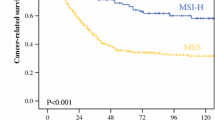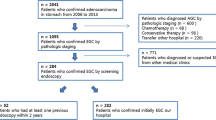Abstract
Background and Aim
Esophagogastroduodenoscopy (EGD) is recommended at 2-year intervals in countries with a high prevalence of gastric cancer. The aim of this study was to determine whether interval gastric cancers that develop within 2 years of a previous complete screening are associated with microsatellite instability (MSI).
Methods
Newly diagnosed gastric cancer patients who had undergone gastrectomy were included. Of these 459 patients, 177 were classified as interval gastric cancer since they were diagnosed within 2 years of a previous EGD. Noninterval gastric cancer patients were subclassified into 65 patients who underwent previous EGD between the past 2 and 10 years and 217 patients without EGD during the last 10 years. Analysis for MSI was conducted using two mononucleotide and three dinucleotide markers.
Results
MSI was found more frequently in noninterval gastric cancers than in interval gastric cancers (p = 0.009). Interval gastric cancers were associated with a higher prevalence of early gastric cancer (p = 0.006), smaller size (p < 0.001), and lower TNM stages (p = 0.006). On logistic regression analysis, noninterval gastric cancers were related to MSI (p = 0.010) and larger size (≥4 cm) (p = 0.009). Subjects with interval gastric cancer showed better survival than those with noninterval gastric cancer (p = 0.006).
Conclusions
During a 2-year screening interval, noninterval gastric cancers tend to be larger, more advanced, and associated with MSI. Biannual EGD screening is effective for detecting small gastric cancers at an early stage, but is not useful in detecting gastric cancers with MSI.


Similar content being viewed by others
References
Nam SY, Choi IJ, Park KW, et al. Effect of repeated endoscopic screening on the incidence and treatment of gastric cancer in health screenees. Eur J Gastroenterol Hepatol. 2009;21:855–860.
Chung SJ, Park MJ, Kang SJ, et al. Effect of annual endoscopic screening on clinicopathologic characteristics and treatment modality of gastric cancer in a high-incidence region of Korea. Int J Cancer. 2012;131:2376–2384.
Sawhney MS, Farrar WD, Gudiseva S, et al. Microsatellite instability in interval colon cancers. Gastroenterology. 2006;131:1700–1705.
Hamilton JP, Meltzer SJ. A review of the genomics of gastric cancer. Clin Gastroenterol Hepatol. 2006;4:416–425.
Lee SY, Chung H, Devaraj B, et al. Microsatellite alterations at selected tetranucleotide repeats are associated with morphologies of colorectal neoplasias. Gastroenterology. 2010;139:1519–1525.
Lee SY, Miyai K, Han HS, et al. Microsatellite instability, EMAST, and morphology associations with T cell infiltration in colorectal neoplasia. Dig Dis Sci. 2012;57:72–78.
Chong JM, Fukayama M, Hayashi Y, et al. Microsatellite instability in the progression of gastric carcinoma. Cancer Res. 1994;54:4595–4597.
Ottini L, Falchetti M, Lupi R, et al. Patterns of genomic instability in gastric cancer: clinical implications and perspectives. Ann Oncol. 2006;17:S97–102.
Yamamoto H, Perez-Piteira J, Yoshida T, et al. Gastric cancers of the microsatellite mutator phenotype display characteristic genetic and clinical features. Gastroenterology. 1999;116:1348–1357.
Buonsanti G, Calistri D, Padovan L, et al. Microsatellite instability in intestinal- and diffuse-type gastric carcinoma. J Pathol. 1997;182:167–173.
Liu P, Zhang XY, Shao Y, et al. Microsatellite instability in gastric cancer and pre-cancerous lesions. World J Gastroenterol. 2005;11:4904–4907.
Choe WH, Lee SY, Lee JH, et al. High frequency of microsatellite instability in intestinal-type gastric cancer in Korean patients. Korean J Intern Med. 2005;20:116–122.
Kim H, An JY, Noh SH, et al. High microsatellite instability predicts good prognosis in intestinal-type gastric cancers. J Gastroenterol Hepatol. 2011;26:585–592.
Lee HS, Choi SI, Lee HK, et al. Distinct clinical features and outcomes of gastric cancers with microsatellite instability. Mod Pathol. 2002;15:632–640.
Zaky AH, Watari J, Tanabe H, et al. Clinicopathologic implications of genetic instability in intestinal-type gastric cancer and intestinal metaplasia as a precancerous lesion: proof of field cancerization in the stomach. Am J Clin Pathol. 2008;129:613–621.
Washington K. 7th edition of the AJCC cancer staging manual: stomach. Ann Surg Oncol. 2010;17:3077–3079.
Tamura G, Sakata K, Nishizuka S, et al. Allelotype of adenoma and differentiated adenocarcinoma of the stomach. J Pathol. 1996;180:371–377.
Zheng L, Wang L, Ajani J, et al. Molecular basis of gastric cancer development and progression. Gastric Cancer. 2004;7:61–77.
Tsukuma H, Oshima A, Narahara H, et al. Natural history of early gastric cancer: a non-concurrent, long term, follow up study. Gut. 2000;47:618–621.
Ling ZQ, Tanaka A, Li P, Nakayama T, et al. Microsatellite instability with promoter methylation and silencing of hMLH1 can regionally occur during progression of gastric carcinoma. Cancer Lett. 2010;297:244–251.
Acknowledgments
This work was supported by the Konkuk University.
Conflict of interest
None.
Author information
Authors and Affiliations
Corresponding author
Rights and permissions
About this article
Cite this article
Choi, H.S., Lee, SY., Kim, J.H. et al. Low Prevalence of Microsatellite Instability in Interval Gastric Cancers. Dig Dis Sci 59, 322–327 (2014). https://doi.org/10.1007/s10620-013-2987-0
Received:
Accepted:
Published:
Issue Date:
DOI: https://doi.org/10.1007/s10620-013-2987-0




